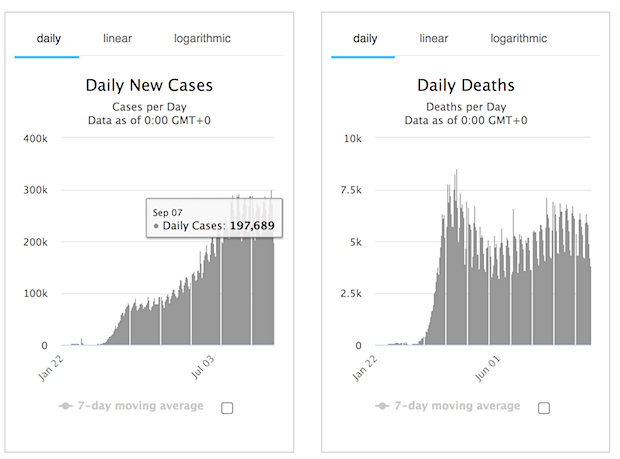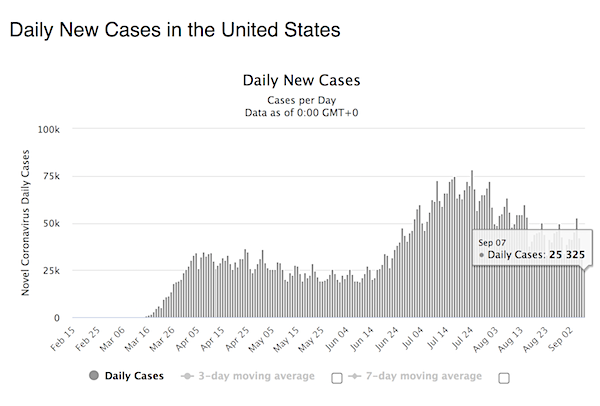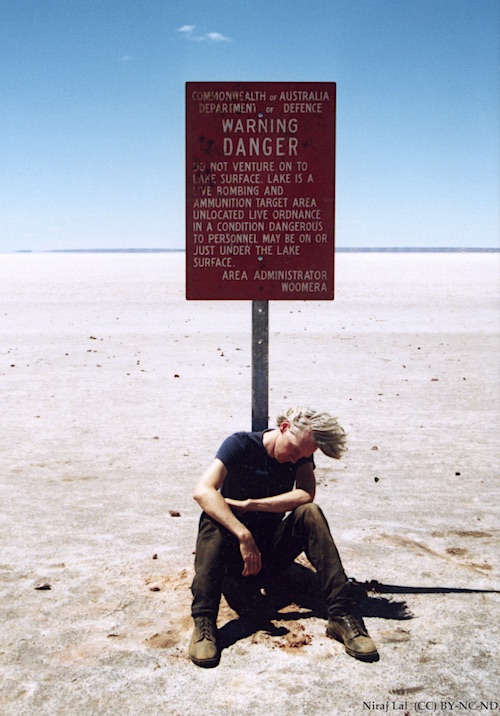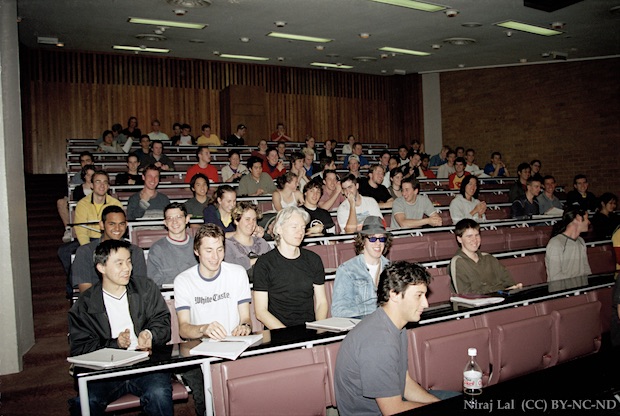
Todd Webb Rue des Plantes, Paris 1950

Lots of Assange stories today, can’t be helped. Read them and you will understand much more much better of what’s happening.
I thought Trump’s remarks vs military brass were interesting, but couldn’t find a decent write-up of them. There’s video though.

Global new cases below 200,000. Lowest since July 13. US new cases lowest since June 14. But much of Europe appears to have a genuine second wave.



Trump on MIC
https://twitter.com/i/status/1303026442435993603
Trump press conference 2
President Trump: "They spied on my campaign and that includes Biden and Obama… If we did what they did, you would have many people in jail right now." pic.twitter.com/1pINNwgImr
— The Hill (@thehill) September 7, 2020

Hope you got yours. And zinc. Note: you can take your vitamin D supplement in a once-a-week dosage, instead of daily.
• Vitamin D Reduces risk of ICU Admission 97% – Study (Covid.US.org)
This is a peer-reviewed, randomized, controlled study of hospitalized Covid-19 patients. So it is an “RCT”. [Correction: no placebo was used. The intervention group received calcifediol and the control group did not. Both groups received BAT, best available treatment.] This is the type of study that the press and various online critics demand. Some persons unwisely reject all other types of studies, which is not reasonable or scientific. But this is the type of study we’ve been waiting for, to confirm the other 20 studies here. The study took place in a university hospital setting: Reina Sofia University Hospital, in Cordoba, Spain. The 76 patients were all hospitalized for confirmed cases of Covid-19. So these are not the mild to moderate, stay-at-home types of patients. The intervention group was 50 patients and the control group was 26 patients.
The intervention group received calcifediol, which is a type of vitamin D found in the blood. It is not the usual type of vitamin D found in supplements. Calcifediol is also known as 25(OH)D or 25-hydroxyvitamin D. The reason for giving this type of vitamin D is that the usual supplement type takes about 7 days to turn into calcifediol, so by giving patients calcifediol itself, you get the good effects without having to wait 7 or so days [per Wikipedia]. The dosage of calcifediol converts to IU (international units at a ratio of 200 to 1). So 10 micrograms of calcifediol is 2000 IU of vitamin D, whereas 10 micrograms of vitamin D3 is 400 IU (a 40:1 ratio).
The dosage given to the patients, in IUs, was:
Day one: 106,400 IU of vitamin D
Day three: 53,200 IU
Day seven: 53,200 IU
Once-a-week thereafter: 53,200 IUThis is equivalent to about 30,000 IU per day for the first week, and 7,600 IU per day thereafter. Yes, you can take your vitamin D supplement in a once-a-week dosage, instead of daily. The results were astounding (and highly statistically significant). “Of 50 patients treated with calcifediol, one required admission to the ICU (2%), while of 26 untreated patients, 13 required admission (50%)”. Would you rather have a 50% risk of needing ICU care, or a 2% risk? Almost all hospitalized Covid-19 patients who die, die in the ICU. That is where the most severe cases are sent. So this study shows that vitamin D reduces the severity of Covid-19.
In the statistically adjusted results, vitamin D reduced the odds of ICU admission by 97%. The RR (risk reduction) for ICU admission in hospitalized Covid-19 patients was 0.03 as compared to the control, which is given the value of 1.00. The odds of Covid-19 patients in general, as compared to hospitalized Covid-19 patients, needing ICU care would be even lower, as you would first need to be hospitalized to enter that risk ratio, and vitamin D has been shown by other studies to reduce risk of hospitalization. So taking a vitamin D supplement has tremendous benefits.

Great piece -long- on the origins of what became WikiLeaks.
• Rubberhose Cryptography And The Idea Behind WikiKeaks (Niraj Lal)
“There is not a crime, there is not a dodge, there is not a trick, there is not a swindle, there is not a vice which does not live by secrecy.” — Joseph Pulitzer
The last dinner that Julian Assange had in relative freedom, 18 June 2012, was takeaway pizza and cheap red wine with a couple of the Wikileaks team and myself in a small flat in London, discussing possible trajectories of American politics for the coming decade. The next morning he walked into the Ecuadorian Embassy to claim political asylum; he hasn’t seen sunlight unguarded since. I first met Julian in the Redmond Barry Physics Lecture Theatre ten years earlier, in 2002, on our first day at the University of Melbourne. The lecturer, the affable Professor Geoff Opat with curly hair and thick-rimmed glasses, in that first hour transformed the topic of ‘units’ — of length, time, and mass — into the powerful concept of ‘dimensional analysis’, a method of answering physics problems simply by determining the underlying units involved. It was a technique later applied to understanding structural opposition to government transparency.
The Melbourne University 1st year Advanced Physics Class, 2002. Photo: Niraj LalJulian took two other subjects in addition to physics that first semester of 2002 — Advanced Maths and a first-year philosophy course titled “Critical Thinking — the Art of Reasoning”. We shared all three classes, but it was during a lunchtime discussion after the philosophy course, sitting on the sandstone steps of Melbourne Uni’s Old Quad, that I first heard him speak about the application of critical thinking to political questions. He was working on a project he called ‘Rubberhose Cryptography’ — a method to allow anyone with valuable digital information to have “plausible deniability” of not having it if someone was standing behind them with a length of thick rubber hose. Julian asked the question: if a journalist with leaked information stored on a USB thumb drive was being interrogated about its contents by a foreign intelligence agency, is there a way that cryptography could enable the journalist to not surrender it?
Even if the intelligence agency were using a thick rubber hose to beat it out of them? The answer, of course, is that agencies have varied means of extracting information that are almost always successful given enough time; rubber hoses are only a crude initial measure before more persuasive techniques can be employed. But Julian found that cryptography can have a role in supporting resistance. Rubberhose Cryptography formed the kernel of TrueCrypt — a program where folders on a drive can be protected by a password, but where the folders are themselves able to contain hidden folders which are only revealed by another password — but where (and here’s the kicker) there isn’t a way of determining whether all folders have been uncovered.
Such a program allows the possibility of “plausible deniability” — where a journalist could reveal one password to a small portion of sensitive information with it being plausible (and unverifiable) that that was all she had to reveal (even if the folder were hiding much larger amounts of sensitive information). Rubberhose and subsequently Truecrypt formed the basis of On-The-Fly-Encryption programs that are used by intelligence communities around the world to this day.
[..] In 2004 Julian competed in the inaugural Australian National Physics Competition held at the ANU, where I was now studying. He stayed with me with his girlfriend at the time, a mathematics PhD student at the ANU, and he mentioned that in addition to physics and maths, he was learning neuroscience and the emerging empirical analytical tools being applied to explore the physiological underpinnings of consciousness, as well as exploring practical examples of cryptography for journalism. In 2005 I received a broadcast email from him outlining the idea behind Wikileaks. It was clear even then that a revolutionary idea had been born.

Julian Assange on the Woomera Missile Test Area, South Australia, 2002. Photo: Niraj Lal

The old charges weren’t going anywhere, so he’s presented with new ones right as he enters the court. That means neither he nor his lawyers, whom he’s not talked to for 6 months, can prepare any defense.
• Julian Assange Re-Arrested Over 18 New Allegations (Sky)
Julian Assange has failed to get new allegations against him thrown out as he battles extradition to the US. The WikiLeaks founder, 49, appeared at the Old Bailey in London after being held for months on remand at high-security Belmarsh Prison. He was re-arrested in the court’s cells on Monday over new charges contained in a US indictment. It details a further 18 charges, lodged in June, which accuse him of plotting to hack computers and obtain and disclose national defence information. They allege that he conspired with army intelligence analyst Chelsea Manning to crack a scrambled password, known as “hash”, to a classified US defence department computer. The charges also offer further details of alleged hacking plotters that Assange and his WikiLeaks colleagues are said to have recruited. The 49-year-old spoke only to state he “does not consent to extradition” and confirm his name. [..]
His lawyer, Mark Summers QC, said the “fresh allegations at the 11th hour” were brought without warning or explanation, which meant they had no time to prepare a response. He highlighted the difficulties Assange faced in speaking to his lawyers in the midst of ongoing restrictions. “It would be an impossible task for the defence to deal with these fresh allegations in any meaningful way in the time that has been afforded to them, and that time is a matter of weeks in respect of which we are provided absolutely no explanation for the late arrival of these matters.” He added: “What is happening is abnormal, unfair and liable to create injustice if allowed to continue.” But District Judge Vanessa Baraitser rejected the defence’s bid to “excise” the allegations, saying: “These are issues which must take place in the context of considering the extradition request and not before it.”
Jennifer Robinson
18/. Assange ‘s lawyer, @suigenerisjen, sets out “serious procedural concerns” with:
* the barring of legal monitors inclding @amnesty. Judge said licenses issued “by mistake”
* restricted access to lawyers who Assange hadn’t seen for 6 months
* new US indictment being issued pic.twitter.com/nildpBGN1Q
— Stefan Simanowitz (@StefSimanowitz) September 7, 2020

The risk of suicide is palpable.
• Julian Assange Lays Out His Case Against US Extradition
Fifteen long months have passed since Julian Assange was physically pulled out of London’s Ecuadorean embassy and taken to the United Kingdom’s Belmarsh prison. There, he’s since awaited an even grimmer prospect: Extradition to the US to face charges of a criminal hacking conspiracy and violations of the Espionage Act. Now his lawyers have laid out a preview of their full case against that extradition—from the argument that the charges pose an unprecedented threat to press freedom to what his doctors describe as evidence that Assange is at high risk of self-harm if he ends up incarcerated in America.
Ahead of Assange’s extradition hearing, which began in London today and is expected to last for several weeks, both prosecutors and the WikiLeaks founder’s defense lawyers submitted “skeleton arguments” to the court that lay out in new detail the central arguments they plan to make in Assange’s extradition case. The defense document in particular reveals Assange’s most complete response yet to the US indictments against him, expanding on an opening statement his attorneys released in February and including snippets of still-unpublished written testimony from a long list of witnesses, from free speech advocates and media scholars to four doctors who have assessed Assange’s mental health.
Assange’s lawyers point to what they describe as flaws in the US indictment against their client and the political nature of the prosecution. The document also includes the warnings of psychiatrists who have diagnosed Assange with Asperger’s, depression, and post-traumatic stress disorder, all of which they say could lead him to harm himself if he’s extradited into the American judicial system. “I think they have a lot of ammunition,” says Tor Ekeland, a well-known hacker defense attorney who has followed Assange’s case and helped to successfully defend British hacker Lauri Love from extradition in 2018. “The most salient things for me are the freedom of speech and the right to publish information that is critical to the public’s ability to understand and evaluate what the government is doing in their name.”
On top of those free speech arguments, the newest details in the defense’s argument serve as evidence of Assange’s declining mental health. Michael Kopelman, a psychiatrist who interviewed Assange several times last year, testified that he observed in Assange signs of suicidal risk including “loss of sleep, loss of weight, a sense of pre-occupation and helplessness as a result of threats to his life, the concealment of a razor blade as a means to self-harm and obsessive ruminations on ways of killing himself.” He writes at one point that Assange expressed having suicidal thoughts “hundreds” of times a day, and that multiple potential suicide implements were confiscated from Assange in prison.
The defense goes on to quote Kopelman pointing out that the WikiLeaks founder has shown signs of preparing for the end of his life, such as seeking Catholic absolution and creating a will. “I reiterate again that I am as certain as a psychiatrist ever can be that, in the event of imminent extradition, Mr. Assange would indeed find a way to commit suicide,” Kopelman writes. Sondra Crosby, another psychiatrist who saw Assange during his time in the Ecuadorean embassy adds, “It is my strong medical opinion that extradition of Mr. Assange to the United States will further damage his current fragile state of health and very likely cause his death. This opinion is not given lightly.”
A third psychiatrist diagnosed Assange with Asperger’s syndrome, noting that the condition would make it more difficult for him to manage life in a US prison. But the prosecutors counter that yet another doctor who interviewed Assange twice while in prison came to the conclusion that he was not a significant suicide risk. The prosecution writes that “neither mental health problems, nor Asperger syndrome prevented Assange’s solicitation of, and orchestration of, the leaking of materials from the highest levels of government and state agencies, apparently on a global scale.”

Craig Murray somehow made it into the courtroom. Scores of others couldn’t even follow proceedings on a TV screen. 40 observers, invited just days before, were told the invitations were a “mistake”. The UK does NOT have a justice system.
• Media Freedom? Which MSM Journalist Opposes the Torture of Assange? (Murray)
Julian Assange has been a light in this darkness. Wikileaks have opened a window into the secret world of war crime, murder and corruption that underlies so much of the governance we live under throughout the “free” world. Coming in the wake of the public realisation that we had been blatantly lied into the destruction of Iraq, there was a time when it seemed Assange would lead us into a new age where whistleblowers, citizen journalists and a democratic internet would revolutionise public information, with the billionaire stranglehold shattered. That seems less hopeful today, as the internet world itself corporatised. Julian is in jail and continuing today is an extradition hearing that has been one long abuse of process.
The appalling conditions of solitary confinement in which he has been kept in the high security Belmarsh Prison, with no access to his legal team or a working computer, to his papers or to his mail, have taken a huge toll on his physical and mental health. The UN Special Representative has declared he is subject to torture. A media which is up in arms about the very dubious attack on Navalny, has no emotion for state torture victim Assange other than contempt. It is constantly asked by Julian’s supporters why the media do not see the assault on a publisher and journalist as a threat to themselves. The answer is that the state and corporate media are confident in their firm alliance with the powers that be. They have no intention of challenging the status quo; their protection from those kicking Assange lies in joining in with the kicking.
I hope to be in court today, and throughout the extradition hearing. The public gallery of 80 has been reduced to 9 “due to Covid”. 5 seats are reserved for Julian’s family and friends, and I have one of these today, but not guaranteed beyond that. There are just 4 seats for the general public. Journalists and NGO’s will be following the hearing online – but only “approved” journalists and NGO’s, selected by the Orwelian Ministry of Justice. I had dinner last night with Assange supporters from a number of registered NGO’s, not one of which had been “approved”. I had applied myself as a representative of Hope Over Fear, and was turned down. It is the same story for those who applied for online access as journalists. Only the officially “approved” will be allowed to watch.
This is supposed to be a public hearing, to which in normal times anybody should be able to walk in off the street into the large public gallery, and anyone with a press card into the press gallery. What is the justification for the political selection of those permitted to watch? An extraordinary online system has been set up, with the state favoured observers given online “rooms” in which only the identified individual will be allowed. Even with approved organisations, it is not the case that an organisation will have a login anyone can use, not even one at a time. Only specifically nominated individuals have to login before proceedings start, and if their connection breaks at any point they will not be readmitted that day.
Given these restrictions, I was very conscious I may need to queue from 5am tomorrow, to get one of the 4 public places, if I drop off the family list. So I went this morning at 6am to the Old Bailey to check out the queue and work out the system. The first six people in the queue were all people who, entirely off their own bat, without my knowledge and with no coordination between them, had arrived while London slept just to reserve a place for me. I was swept up by their goodness, their trust in me and by their sheer humanitarian concern about Julian and the whole miscarriage of justice. I chatted cheerily with them for a while, then came back to write this, but just got round the corner when I burst into floods of tears, overwhelmed by all this kindness.

Tommy Robinson -yeah, that one- is of the few people Assange has had contact with while in Belmarsh.
• Tommy Robinson Appeals to President Donald Trump: “Free Julian Assange!“ (GP)
British patriotic activist Tommy Robinson has issued a dramatic appeal to President Donald Trump on the eve of Julian Assange‘s extradition hearing, which begins on Monday in Old Bailey Central Criminal Court in London. German politician and frequent Gateway Pundit interview partner Petr Bystron (AfD foreign policy speaker) traveled to the UK Friday ahead of the Assange hearing and interviewed Tommy Robinson outside Belmarsh prison, the same maximum security prison where Robinson was held last year on trumped-up charges of “disturbing the peace” for reporting on a “Grooming Gang” mass rape trial. “Between when I was brought into this prison and left this prison I only saw one other person: Julian Assange”, Robinson said.
“I spent three months in total isolation, seeing no one. I know the damaging effect that had on me for just three months. Julian Assange has been here over a year.” Belmarsh is the UK’s top Maximum Security Prison, where only the highest level of murderers and terrorists are usually held. Islam critic Robinson, who has survived several attempts on his life by Muslims while in prison on various trumped-up misdemeanors such as mortgage fraud or immigration violations, was kept in solitary confinement for his own safety: “I was totally separated. I had my own wing. I had an exercise yard, where I could walk around for 30 minutes a day. And Julian Assange’s window was there, so we could talk.” Assange was on the health care wing at the time, where he wasn’t allowed to exercise, or to do the things other prisoners are, Robinson said.
His mental state had suffered, according to Robinson: “We had good discussions, but after speaking to staff and shouting, I saw how his mental health has deteriorated. He was a mess. A total mess. Breakdown, crying. But that’s totally to be expected. I only spent three months in total isolation. Isolation may sound easy, but they know it’s not. It’s a medical fact that solitary confinement is mental torture.” Robinson pointed out Julian Assange is being held without charges, on extradition to the US only: “This man’s committed no violence. He’s not in here for a violent crime. He’s not even proven to have committed a crime. He spent over a year. I hate to think of the long-lasting effect his sentence would have had on that man. He wouldn’t be a human if he hadn’t already been broken.”
Tommy Robinson and Petr Bystron directed a dramatic appeal to President Donald Trump: “I watched what happened to his case and I expected Donald Trump to pardon him,” Robinson said. “I think a lot of people expected it. Free Julian Assange!” Bystron agreed: “This is an appeal to Donald Trump. Free Julian Assange!” Tommy called Assange “a political prisoner” in a UK jail: “What has happened to him in that prison is not right. It’s mental torture. And he’s been forgotten.” [..] “I know the amount of mail he must receive – the prison guards told me he has his own room for the support he gets,” Robinson said. “But it’s no good getting support when you’re locked in a cell. He saw no way out. That’s what he was saying. They don’t ever want him to see daylight again.”

I like Turley, it’s good to see the law laid out, but he overextends himself hugely here. Like he’s afraid to criticize the Atlantic’s story. There are now 10 named(!) sources who were present and say Trump never made those remarks.
• Trump and The Press Destroyed The Public’s Ability To Judge Scandals (Turley)
Trump has reached a point where there is nothing that most of us would rule out in terms of shocking or offensive statements. He often refers to people as “losers” and allegedly once said that of those who fought in Vietnam instead of getting a deferment or medical exclusion, as he did. If an article included such an alleged statement by either President Bush, it would have been dismissed instantly as ridiculous. Over the past three years Trump has made himself vulnerable to such allegations, due to his history of outrageous remarks. Yet the same is true of the media. Three years ago, a story of this kind would have been devastating for any president — but the media has rendered itself as unbelievable as the subject of its current ire.
While denouncing Trump as a pathological liar, the media has been pathologically biased. Polls consistently show the media racing Trump to the bottom on trustworthiness. Most of the media now feeds a steady diet of unrelentingly negative stories to a shrinking audience of true believers. As a result, the media has hit a historic low, with less than half of the populace finding it credible. Some polls show that the only group deemed less trustworthy than Trump is the media. The Knight Foundation has found that three-fourths of the public believe the media is too biased; some 54 percent believe reporters regularly misrepresent facts, and 28 percent believe reporters make things up entirely. There is a reason for this view of bias: It’s true. Many journalists do not attempt to hide their anti-Trump agendas.
In the age of “echo-journalism,” it is even viewed as an essential commitment on some networks. False stories about Trump or Trump aides have been published regularly, only to be quietly withdrawn or “corrected” after the news cycle has run. Indeed, as reporters pummeled the White House with angry questions over the Atlantic story, a press conference held by Democratic nominee Joe Biden was the very image of deference and decorum. Reporters seemed to go out of their way to confirm months of criticism over the softball treatment given to Biden. Atlantic staff writer Edward Isaac Dovere asked Biden: “When you hear these remarks — ‘suckers,’ ‘losers,’ recoiling from amputees — what does it tell you about President Trump’s soul and the life he leads?”
There was a time when a statement in a major publication was taken as true. My children, however, have no such presumption about any news source. Even more disturbing, neither do I these days. The Atlantic article embodies the discomfort with movement journalism. It has been the repository of all things anti-Trump, with such articles as “Donald Trump, the Most Unmanly President” and “Donald Trump is a Broken Man.” Past claims in the Atlantic on the Trump campaign, like former Attorney General Jeff Sessions colluding with Russians, were debunked by the special counsel investigation. In an age of echo chamber journalism, The Atlantic is deafening.
[..] The real story this week is not whether Trump or The Atlantic are lying but why either possibility is viewed as equally plausible. The public is left with an incredible tale told by two equally noncredible sources. That is the real story — and a truly sad one.
WH campaign director on Atlantic story
“Journalism was abandoned” — Trump campaign’s @ErinMPerrine doubles down against The Atlantic pic.twitter.com/cAYpThCdym
— TV News HQ (@TVNewsHQ) September 6, 2020

“..it will bring on a years’ long quasi civil war sure to finish off the institutions of a federal republic and also whatever remains of the US economy.”
• The Ghost in the Machine (Jim Kunstler)
The abiding mystery of the 2020 election is how come the Democratic Party, wishing so zealously to win back power, took pains to nominate a candidate weaker than the ghost of Millard Fillmore. Resorting to Occam’s Razor, one might have to conclude that Joe Biden was simply the best they had — a surefire case for the party’s necessary extinction. The Labor Day starting-gun kicks off the high campaign season and Ol’ White Joe wobbles forth from his lair under a rock somewhere to dazzle audiences of six or eight sympathetic journos posed in “social distancing” formation while the party’s Antifa and BLM shock troops soften up voters elsewhere across the land with vote-winning riots, arson, and looting. There’s a recipe for political success!
You have to wonder how the claque of DC deep state players behind this fiasco could come up with a game-plan so stupidly inept… but there it is! Apparently, they’re laying further plans now to bum-rush Ol’ Joe into the White House by main force with a “color revolution” — that is, an orchestrated fake popular revolt as in the Ukraine Maidan regime change operation of 2014. In fact, as Revolver News reports, the same wrecking crew of US State Department officials, intel spooks, contract insurrectionists, and George Soros-sponsored NGO intriguers is behind the US 2020 “Transition Integrity Project” aimed at launching a US post-election coup against Mr. Trump, no matter how the election actually goes.
The plan was all over the web wires this holiday weekend. Everybody knows exactly what to expect now: a November 3 Trump election victory followed by a king-tide of post-election write-in votes for Ol’ Joe… a long, drawn-out, and surely inconclusive battle trying to validate scores of millions of postmarks and signatures… and a skein of Lawfare-managed shenanigans conducted in battleground state legislatures to change-out electoral college slates. And any objections by Mr. Trump and his party will be labeled as Putin-backed fascist treason. Will that result in Mr. Biden actually gliding into the oval office? No, it will bring on a years’ long quasi civil war sure to finish off the institutions of a federal republic and also whatever remains of the US economy.

We try to run the Automatic Earth on donations. Since ad revenue has collapsed, your support is now an integral part of the process.
Thank you for your ongoing support.



Support the Automatic Earth in virustime.









Home › Forums › Debt Rattle September 8 2020